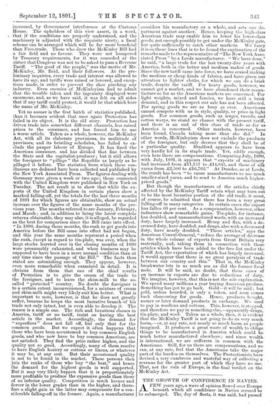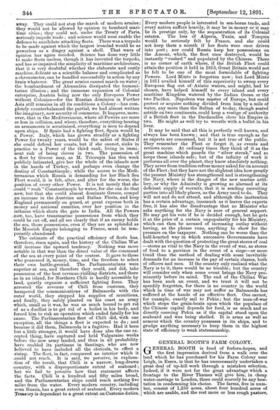THE GROWTH OF CONFIDENCE IN NAVIES.
.A.FEW years ago, a wave of opinion flowed over Europe beneath which all confidence in Navies seemed to be submerged. The, day of fleets, it was said, had passed away. They could not stop the march of modern armies ; they would not be allowed by opinion to bombard mari- time cities ; they could not, under the Treaty of Paris, seriously impede trade ; and science would soon enable the defence to annihilate attacking fleets. There was a torpedo to be made against which the largest ironclad would be as powerless as a dingey against a shell. That wave of opinion has again receded. Science has done very little to make fleets useless, though it has invented the torpedo, and has so impaired the simplicity of maritime architecture, that it is very doubtful whether the elaborate and costly machine, delicate as a scientific balance and complicated as a chronometer, can be handled successfully in action by any brain whatever. The great armies cannot march on water ; the bombardment of Alexandria dissipated the humani- tarian illusion ; and the immense expansion of Colonial enterprise, Austria being now the only European Power without Colonies—for the Russian dominion in Further Asia still remains in all its conditions a Colony—has com- pletely counterbalanced the partial, we had almost written the imaginary, new security of commerce. It happens, more- . over, that in the Mediterranean, where all Powers are more or less in collision, and where, therefore, everything bearing on armaments is scrutinised, everything is seen to depend upon ships. If Spain had a fighting fleet, Spain would be a Power. Italy, which has grown steadily as a fighting . Power for twenty years, would be the safest of States if she could defend her coasts, but if she cannot, sinks in practice to a Power of the third rank, living in immi- nent risk of being cloven in two. The possession of a fleet by Greece may, as M. Tricoupis has this week publicly intimated, give her the whole of the islands now in the hands of Turkey, and perhaps even change the destiny of Constantinople ; while the access to the Medi- terranean which Russia is demanding for her Black Sea Fleet would, it is felt, alter, and alter for the worse, the ,position of every other Power. It is not merely that she -nould " rush " Constantinople by water, for she can do that .now, but that she could almost dominate Greece, compel ',An increase in the Austrian and Italian Fleets, and keep England permanently on guard, at great expense both in .money and national enmities, over her position in the isthmus which shuts the gate to India. All the Powers .now, too, have transmarine possessions from which they . could be cut off, and all see clearly that if an enemy holds the sea, those possessions, even if they are as splendid as the Moorish Empire belonging to France, must be tem- porarily abandoned. The estimate of the practical efficiency of fleets has, therefore, risen again, and the history of the Chilian War. will increase the upward tendency. Nothing was more notable in that war than the direct value of the command of the sea at every point of the contest. It gave to those who possessed it, money, time, and the freedom to select their own battle-ground. The Parliamentarians were superior at sea, and therefore they could, and did, take possession of the best revenue-yielding districts, and there as in an island, for Northern Chili is hardly accessible by land, quietly organise a sufficient fighting force. They arrested the revenue of Chili from customs, they hampered the communications of Balmaceda with the outer world, they stopped his supplies of munitions, ,and finally, they safely planted on his coast an army which, small as it was, he was as much bound to get rid of as a duellist is to get rid of a bullet in his body, and forced him to risk an operation which ended fatally for his cause. The Parliamentarian fleet of Chili did, with one exception, all the things a fleet is expected to do ; and because it did them, Balmaceda is a fugitive. Had it been but a little stronger, it would have done also the one ex- • cepted thing, have captured and held Valparaiso weeks before the new army landed, and thus in all probability have enabled its partisans in Santiago, who are now believed to have included all the clericals, to effect a .rising. The fleet, in fact, conquered an interior which it .could not reach. It is said, we perceive, in explana- Aim of the result, that Chili is a narrow, long-drawn 'country, with a disproportionate extent of seaboard ; but we fail to perceive how that statement affects the facts. Chili is a hundred and fifty miles broad, and the Parliamentarian ships could reach nothing five miles from the water. Every modern country, including even Russia, has a great extent of seaboard. Every modern Treasury is dependent to a great extent on Customs duties. Every modern people is interested in sea-borne trade, and every nation suffers heavily, it may be in money or it may be in prestige only, by the sequestration of its Colonial estates. The loss of Algeria, Tunis, and Tonquin would be seriously felt by France, and she could.
not keep them a month if her fleets were once driven into port ; nor could Russia keep her possessions on the Amour, which, the fleet once destroyed, would be instantly " rushed " and populated by the Chinese. There is no corner of earth where, if the British Fleet could attain the position it held in 1813, Great Britain would not be felt to be one of the most formidable of fighting Powers. Lord Minto is forgotten now ; but Lord Minto in 1811 availed himself of this superiority to sweep every European flag out of Asiatic waters, and might, had he chosen, have helped himself to every island and every maritime • Kingdom watered by the Indian Ocean or the two Pacifies. Napoleon was master of Europe, but could protect or acquire nothing divided from him by a mile of water, any more than the Sultan of to-day, though seated astride on two continents, could keep a vestige of authority if a British fleet in the Dardanelles clove his Empire in two. He might as well try to wrestle with a bullet in his liver.
It may be said that all this is perfectly well known, and always has been known ; and that is true enough as far as experts are concerned, but it is not true of the public. They remember the Fleet or forget it, as events and reviews occur. At ordinary times they think of it as the great machine which guards the " silver streak," and so keeps these islands safe ; but of the infinity of work it performs all over the planet, they know absolutely nothing. They never from tradition refuse money asked for on account of the Fleet ; but they have not the slightest idea how greatly the present Ministry has strengthened and is strengthening the Navy, where is the 'danger of the new marine artil- lery, or why the Admiralty is growing so alarmed at its deficient supply of recruits, that it is sending recruiting parties into all likely places, as the Army used to do. They will not and do not attend, and although this inattention has a certain advantage, inasmuch as it leaves the experts free, it has also the disadvantage that no Minister who asks anything for the Navy is sure of general support. He may get his vote if he is decided enough, but he gets it at the price of a certain unpopularity for his Ministry, which can then be accused of increasing outlay without having, as the phrase runs, anything to show for the pressure on the taxpayer. Nothing can be worse than the half-hearted way in which successive, Governments have dealt with the question of protecting the great stores of coal —stores as vital to the Navy in the event of war, as stores of food to a garrison in the event of a siege—or more timid than the method of dealing with some inevitable demands for an increase in the pay of certain classes, both of officers and men. If the country only realised what the Navy is to it, there would be no trouble ; but the country will consider only when some event brings the Navy pro- minently before-its mind. The end of the Chilian War has been such an event, and we trust it will not be speedily forgotten, for there is no country in the world which in time of war may not suffer as Balmaceda has suffered at the hands of an effective fleet. One cannot, for example, exactly sail to Pekin ; but the man-of-war which stops the grain-boats upon which the populace of the Chinese capital depends for food, is as much and as directly coercing Pekin as if the capital stood upon the seaboard and was being shelled. It is arms as well as armour which the country possesses in its ships, and to grudge anything necessary to keep them in the highest state of efficiency is weak statesmanship.



































 Previous page
Previous page